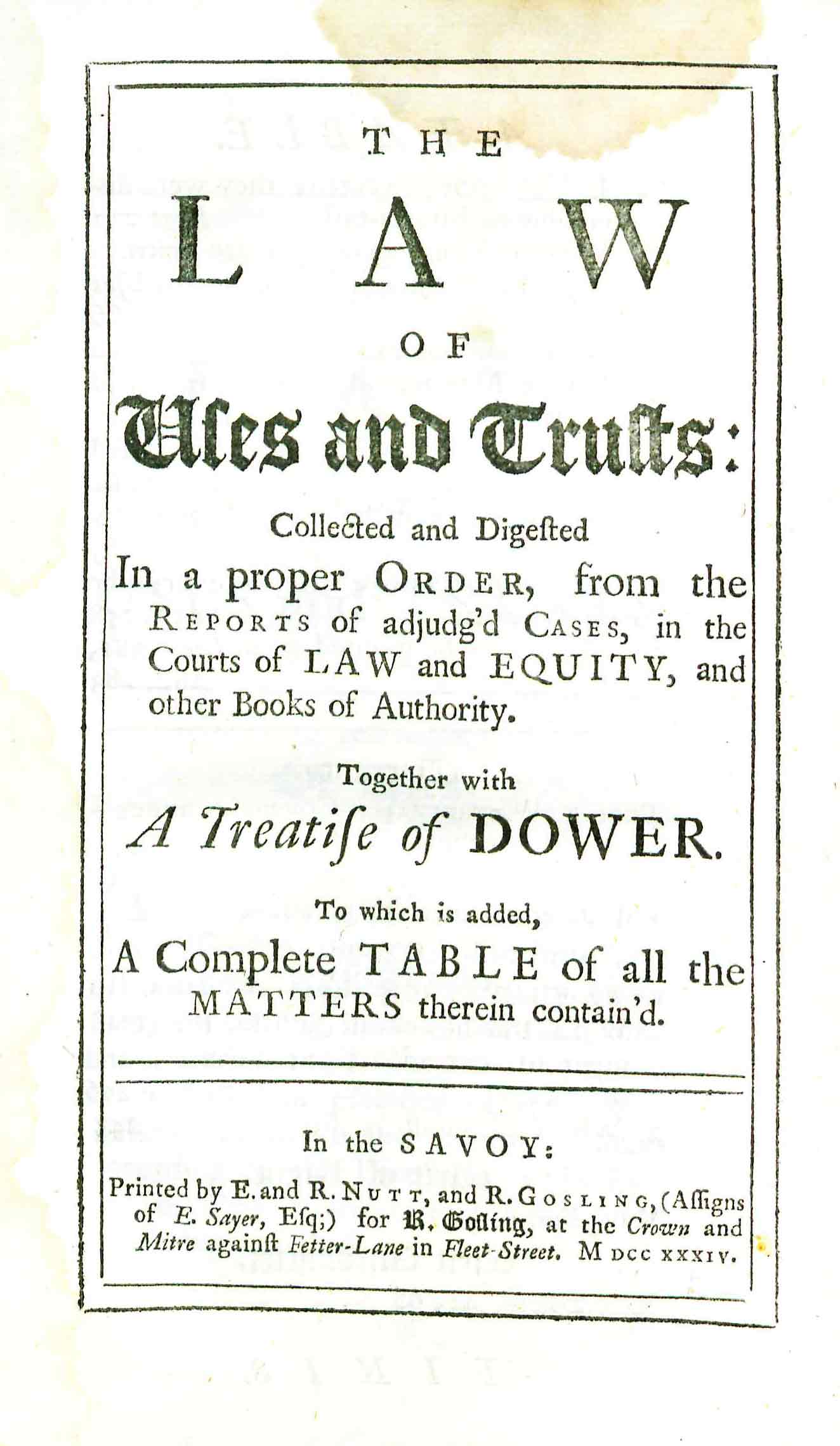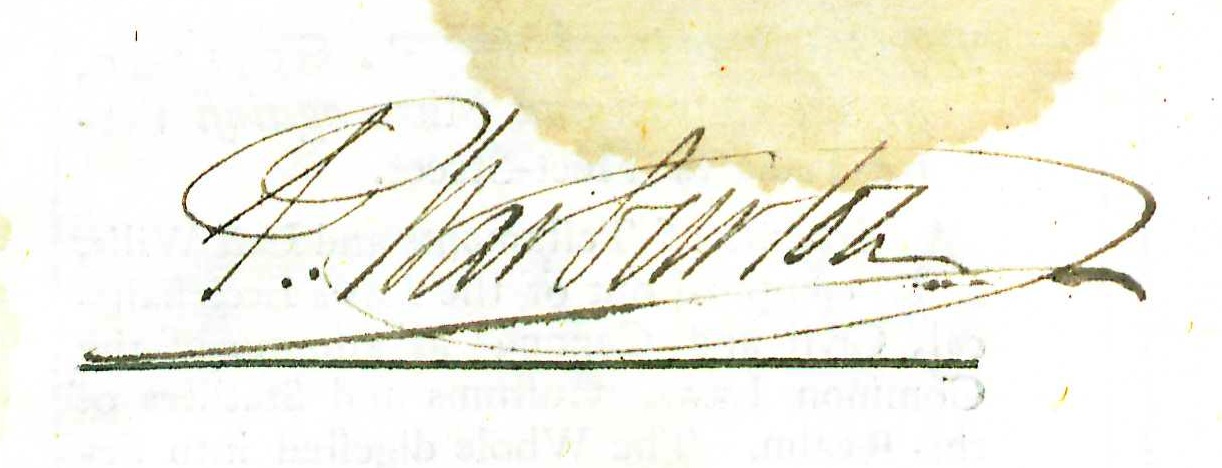Difference between revisions of "Law of Uses and Trusts"
Dbthompson (talk | contribs) (→Description of the Wolf Law Library's copy) |
m |
||
| (9 intermediate revisions by 4 users not shown) | |||
| Line 4: | Line 4: | ||
{{BookPageInfoBox | {{BookPageInfoBox | ||
|imagename=GilbertLawOfUses1734.jpg | |imagename=GilbertLawOfUses1734.jpg | ||
| − | |link=https:// | + | |link=https://wm.primo.exlibrisgroup.com/permalink/01COWM_INST/g9pr7p/alma991003257089703196 |
|shorttitle=The Law of Uses and Trusts | |shorttitle=The Law of Uses and Trusts | ||
| − | |author=Geoffrey Gilbert | + | |author=[[:Category:Geoffrey Gilbert|Geoffrey Gilbert]] |
| − | |publoc=In the Savoy | + | |publoc=[[:Category:London|In the Savoy]] |
|publisher=Printed by E. and R. Nutt, and R. Gosling (Assigns of E. Sayer, Esq;) for R. Gosling | |publisher=Printed by E. and R. Nutt, and R. Gosling (Assigns of E. Sayer, Esq;) for R. Gosling | ||
|year=1734 | |year=1734 | ||
|edition=First | |edition=First | ||
| − | |lang=English | + | |lang=[[:Category:English|English]] |
|pages=[4], 437, [81] | |pages=[4], 437, [81] | ||
| − | |desc=8vo (20 cm.) | + | |desc=[[:Category:Octavos|8vo]] (20 cm.) |
|shelf=F-3 | |shelf=F-3 | ||
| − | }}[[File:GilbertLawOfUsesAndTrusts1734HalfTitle.jpg|left|thumb| | + | }}[[File:GilbertLawOfUsesAndTrusts1734HalfTitle.jpg|left|thumb|300px|<center>Frontispiece.</center>]] [[wikipedia:Jeffrey Gilbert (judge)|Sir Geoffrey Gilbert]] (sometimes Jeffray or Jeffrey Gilbert) (1674 – 1726) was a British attorney, judge, and legal scholar. Not much is known about Gilbert's early life, but based on his later works it is clear that he received a classical education as a child.<ref>M. Macnair, "[https://doi.org/10.1093/ref:odnb/10688 Gilbert, Sir Jeffray (1674–1726)]" in ''Oxford Dictionary of National Biography'', Oxford University Press, 2004, accessed October 17, 2013.</ref> He was admitted to the Inner Temple in 1692 and called to the bar in 1698. Gilbert was not a particularly well-known lawyer early in his career, but in 1715 he was appointed a puisne judge of the Court of King's Bench in Ireland.<ref>Ibid.</ref> Soon after he was given that position, the Chief Baron of the Irish Exchequer died unexpectedly. No other judges were prepared to take his place, so the position was given to Gilbert.<ref>Ibid.</ref> |
| − | + | ||
| − | + | Gilbert's defining moment came in the case of ''Annesley v. Sherlock'', which turned on the issue of whether appeals from equity jurisdictions in Ireland should be handled by the Irish or by the British House of Lords.<ref>Ibid.</ref> Gilbert followed the orders of the British Lords in preference to those of the Irish, which led to the Irish Lords ordering his arrest.<ref>Ibid.</ref> Following Gilbert’s display of British loyalty, he was rewarded with the post of puisne baron of the English exchequer.<ref>Ibid.</ref> He was later appointed to the commission for the English Great Seal and knighted.<ref>Ibid.</ref> Shortly before Gilbert's death he was elected a fellow of the Royal Society.<ref>"[http://royalsociety.org/DServe/dserve.exe?dsqIni=Dserve.ini&dsqApp=Archive&dsqCmd=Show.tcl&dsqDb=Persons&dsqPos=7&dsqSearch=%28Surname%3D%27gilbert%27%29 Gilbert; Sir; Jeffrey (1674 - 1726)]," The Royal Society website, accessed October 17, 2013.</ref> | |
| − | + | ||
| − | Despite the influence he wielded during his lifetime, | + | Despite the influence he wielded during his lifetime, Gilbert's major contributions to law came posthumously. After his death a large collection of manuscripts was found covering almost the entirety of English law and practice.<ref>Macnair, "Gilbert, Sir Jeffray."</ref> These works were gradually published in the decades following Gilbert's death, and they remained influential for decades after their publication. Some legal historians have called Gilbert probably the most eminent author who ever sat on the Irish Bench.<ref> F. Elrington Ball, "VII," in ''The Judges in Ireland, 1221-1921'' (Clark, N.J.: Lawbook Exchange, 2005), 82.</ref> |
==Evidence for Inclusion in Wythe's Library== | ==Evidence for Inclusion in Wythe's Library== | ||
| − | Listed in the [[Jefferson Inventory]] of [[Wythe's Library]] as "[Law of] Uses & trusts 8vo." and given by [[Thomas Jefferson]] to [[Dabney Carr]]. The [https://digitalarchive.wm.edu/handle/10288/13433 Brown Bibliography]<ref> Bennie Brown, "The Library of George Wythe of Williamsburg and Richmond," (unpublished manuscript, May, 2012) Microsoft Word file. Earlier edition available at: https://digitalarchive.wm.edu/handle/10288/13433</ref> includes the first edition while [ | + | Listed in the [[Jefferson Inventory]] of [[Wythe's Library]] as "[Law of] Uses & trusts 8vo." and given by [[Thomas Jefferson]] to [[Dabney Carr]]. The [https://digitalarchive.wm.edu/handle/10288/13433 Brown Bibliography]<ref> Bennie Brown, "The Library of George Wythe of Williamsburg and Richmond," (unpublished manuscript, May, 2012) Microsoft Word file. Earlier edition available at: https://digitalarchive.wm.edu/handle/10288/13433</ref> includes the first edition while [https://www.librarything.com/profile/GeorgeWythe George Wythe's Library]<ref>''LibraryThing'', s.v. [https://www.librarything.com/profile/GeorgeWythe "Member: George Wythe"], accessed on September 16, 2013.</ref> on LibraryThing indicates "Precise edition unknown. Octavo editions were published at London in 1734 and 1741." The Wolf Law Library followed Brown's recommendation and moved a copy of the first edition from another rare book collection to the [[George Wythe Collection]]. |
==Description of the Wolf Law Library's copy== | ==Description of the Wolf Law Library's copy== | ||
Bound in contemporary blind calf. Inscribed "P. Warburton" on the half-title. Purchased through the generosity of Daniel W. Baran and Lena Stratton Baran, Class of 1936. | Bound in contemporary blind calf. Inscribed "P. Warburton" on the half-title. Purchased through the generosity of Daniel W. Baran and Lena Stratton Baran, Class of 1936. | ||
| − | Images of the library's copy of this book are [https://www.flickr.com/photos/wolflawlibrary/albums/72157637448808204 available on Flickr.] View the record for this book in [https:// | + | Images of the library's copy of this book are [https://www.flickr.com/photos/wolflawlibrary/albums/72157637448808204 available on Flickr.] View the record for this book in [https://wm.primo.exlibrisgroup.com/permalink/01COWM_INST/g9pr7p/alma991003257089703196 William & Mary's online catalog.] |
| + | |||
| + | ===Full text=== | ||
| + | *[https://lawlibrary.wm.edu/wythepedia/library/GilbertLawOfUsesAndTrusts1734.pdf ''The Law of Uses and Trusts''] (17MB PDF) | ||
==See also== | ==See also== | ||
| Line 42: | Line 45: | ||
[[Category:Dabney Carr's Books]] | [[Category:Dabney Carr's Books]] | ||
| + | [[Category:Geoffrey Gilbert]] | ||
[[Category:George Wythe Collection at William & Mary's Wolf Law Library]] | [[Category:George Wythe Collection at William & Mary's Wolf Law Library]] | ||
[[Category:Property]] | [[Category:Property]] | ||
[[Category:Titles in Wythe's Library]] | [[Category:Titles in Wythe's Library]] | ||
| + | |||
| + | [[Category:English]] | ||
| + | [[Category:London]] | ||
| + | [[Category:Octavos]] | ||
Revision as of 11:54, 25 August 2023
by Geoffrey Gilbert
| The Law of Uses and Trusts | |
|
Title page from The Law of Uses and Trusts, George Wythe Collection, Wolf Law Library, College of William & Mary. | |
| Author | Geoffrey Gilbert |
| Published | In the Savoy: Printed by E. and R. Nutt, and R. Gosling (Assigns of E. Sayer, Esq;) for R. Gosling |
| Date | 1734 |
| Edition | First |
| Language | English |
| Pages | [4], 437, [81] |
| Desc. | 8vo (20 cm.) |
| Location | Shelf F-3 |
Gilbert's defining moment came in the case of Annesley v. Sherlock, which turned on the issue of whether appeals from equity jurisdictions in Ireland should be handled by the Irish or by the British House of Lords.[4] Gilbert followed the orders of the British Lords in preference to those of the Irish, which led to the Irish Lords ordering his arrest.[5] Following Gilbert’s display of British loyalty, he was rewarded with the post of puisne baron of the English exchequer.[6] He was later appointed to the commission for the English Great Seal and knighted.[7] Shortly before Gilbert's death he was elected a fellow of the Royal Society.[8]
Despite the influence he wielded during his lifetime, Gilbert's major contributions to law came posthumously. After his death a large collection of manuscripts was found covering almost the entirety of English law and practice.[9] These works were gradually published in the decades following Gilbert's death, and they remained influential for decades after their publication. Some legal historians have called Gilbert probably the most eminent author who ever sat on the Irish Bench.[10]
Evidence for Inclusion in Wythe's Library
Listed in the Jefferson Inventory of Wythe's Library as "[Law of] Uses & trusts 8vo." and given by Thomas Jefferson to Dabney Carr. The Brown Bibliography[11] includes the first edition while George Wythe's Library[12] on LibraryThing indicates "Precise edition unknown. Octavo editions were published at London in 1734 and 1741." The Wolf Law Library followed Brown's recommendation and moved a copy of the first edition from another rare book collection to the George Wythe Collection.
Description of the Wolf Law Library's copy
Bound in contemporary blind calf. Inscribed "P. Warburton" on the half-title. Purchased through the generosity of Daniel W. Baran and Lena Stratton Baran, Class of 1936.
Images of the library's copy of this book are available on Flickr. View the record for this book in William & Mary's online catalog.
Full text
- The Law of Uses and Trusts (17MB PDF)
See also
- George Wythe Room
- Jefferson Inventory
- The Law of Devises, Revocations, and Last Wills
- The Law of Evidence
- The History and Practice of the High Court of Chancery
- Reports of Cases in Equity
- Wythe's Library
References
- ↑ M. Macnair, "Gilbert, Sir Jeffray (1674–1726)" in Oxford Dictionary of National Biography, Oxford University Press, 2004, accessed October 17, 2013.
- ↑ Ibid.
- ↑ Ibid.
- ↑ Ibid.
- ↑ Ibid.
- ↑ Ibid.
- ↑ Ibid.
- ↑ "Gilbert; Sir; Jeffrey (1674 - 1726)," The Royal Society website, accessed October 17, 2013.
- ↑ Macnair, "Gilbert, Sir Jeffray."
- ↑ F. Elrington Ball, "VII," in The Judges in Ireland, 1221-1921 (Clark, N.J.: Lawbook Exchange, 2005), 82.
- ↑ Bennie Brown, "The Library of George Wythe of Williamsburg and Richmond," (unpublished manuscript, May, 2012) Microsoft Word file. Earlier edition available at: https://digitalarchive.wm.edu/handle/10288/13433
- ↑ LibraryThing, s.v. "Member: George Wythe", accessed on September 16, 2013.

